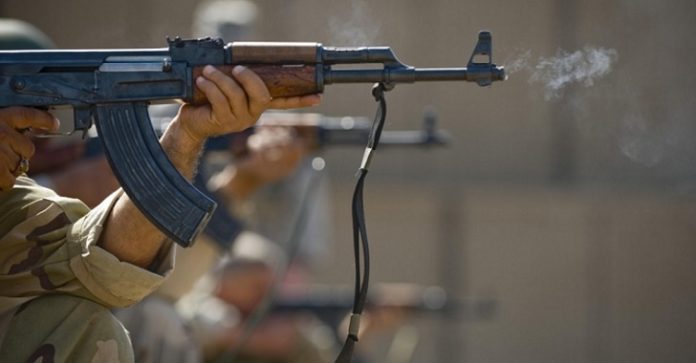
By Darius Shahtahmasebi at theantimedia.org
Corporate media regularly attempts to present Bashar al-Assad’s regime in Syria as solely responsible for the ongoing conflict in the region. The media does report on events that contradict this narrative — albeit sparingly — but taken together, these underreported details shine a new light on the conflict.
10: Bashar al-Assad has a higher approval rating than Barack Obama
Despite Obama’s claims Assad is illegitimate and must step down, the fact remains that since the conflict erupted in 2011, Assad has held the majority support of his people. The elections in 2014 – which Assad won by a landslide with international observers claiming no violations – is a testament to the fact that although Assad has been accused of serious human rights violations, he continues to remain reasonably popular with the Syrian people.
Obama, on the other hand, won elections in 2012 with a voter turnout of a mere 53.6 percent of the American public; only 129.1 million total were votes cast. This means approximately 189.8 million American people did notvote for Obama. His current approval rating sits at about 50 percent.
9: The “moderate” opposition has been hijacked
There is no longer such a thing as “moderate” opposition in Syria – if there ever was. The so-called Western-backed Free Syrian Army (FSA) has been dominated by extremists for years. The U.S. has known this yet has continued to support the Syrian opposition, despite the fact the New York Times reported in 2012 that the majority of weapons being sent to Syria have been ending up in the hands of jihadists. A classified DIA report predicted the rise of ISIS in 2012, stating:
“If the situation unravels, there is the possibility of establishing a declared or undeclared Salafist principality in eastern Syria… and this is exactly what the supporting powers to the opposition want, in order to isolate the Syrian regime.”
Further, an FSA commander went on record not only to admit his fighters regularly conduct joint operations with al-Nusra (al-Qaeda in Syria), but also that he would like to see Syria ruled by Sharia law.
Apparently, moderate can also mean “al-Qaeda affiliated fanatic.”
8: Assad never used chemical weapons on his own people
A U.N. investigation into the first major chemical weapons attack committed in early 2013 — an atrocity the West immediately pinned on Assad — concluded the evidence suggested the attack was more likely committed by the Syrian opposition. A subsequent U.N. investigation into the August 2013 attack never laid blame on anyone, including Assad’s forces. In December 2013, Pulitzer prize-winning journalist Seymour Hersh released an articlehighlighting deficiencies in the way the situation was handled:
“In the months before the attack, the American intelligence agencies produced a series of highly classified reports…citing evidence that the al-Nusra Front, a jihadi group affiliated with al-Qaida, had mastered the mechanics of creating sarin and was capable of manufacturing it in quantity. When the attack occurred al-Nusra should have been a suspect, but the administration cherry-picked intelligence to justify a strike against Assad.”
7: Toppling the Syrian regime was part of a plan adopted shortly after 9/11
According to a memo disclosed by 4-star General Wesley Clark, shortly after 9/11, the Pentagon adopted a plan to topple the governments of seven countries within five years. The countries were Iraq, Lebanon, Libya, Somalia, Sudan, Syria, and Iran.
As we know, Iraq was invaded in 2003. American ally Israel tried its hand at taking out Lebanon in 2006. Libya was destroyed in 2011. Prior to this intervention, Libya had the highest standard of living of any country in Africa. In 2015, alone, it dropped 27 places on the U.N. Human Development Index rating. U.S. drones fly over Somalia, U.S. troops are stationed in South Sudan — Sudan was partitioned following a brutal civil war — and Syria has been the scene of a deadly war since 2011. This leaves only Iran, which is discussed below.
6: Iran and Syria have a mutual defense agreement
Since 2005, Iran and Syria have been bound by a mutual defense agreement. The Iranian government has shown they intend to fully honor this agreement and has provided the Syrian regime with all manner of support, including troops, a $1 billion credit line, training, and advisement. What makes this conflict even more dangerous, however, is the fact Russia and China have sided with Iran and Syria, stating openly they will not tolerate any attack on Iran. Russia’s military intervention in Syria in recent months proves these are not idle threats – they have put their money where their mouth is.
Iran has been in the crosshairs of the U.S. foreign policy establishment for some time now. George W. Bush failed to generate the support needed to attack Iran during his time in office — though not for lack of trying — and since 2012, sanctions have been the go-to mantra. By attacking and destabilizing Iran’s most important ally in the region, the powers that be can undermine Iranian attempts to spread its influence in the region, ultimately further weakening Iran.
5: Former Apple CEO is the son of a Syrian refugee
The late Steve Jobs, founder of Apple, was the son of a Syrian who moved to the United States in the 1950s. This is particularly amusing given the amount of xenophobia, Islamophobia, racism and hatred refugees and migrants seem to have inspired — even from aspiring presidents. Will a President Donald Trump create the conditions in which future technological pioneers may never reach the United States? His rhetoric seems toindicate as much.
4: ISIS arose out of the U.S. invasion of Iraq, not the Syrian conflict
ISIS was formerly known as al-Qaeda in Iraq, which rose to prominence following the U.S.-U.K. led invasion of Iraq in 2003. It is well-known that there was no tangible al-Qaeda presence in Iraq until after the invasion, and there is a reason for this. When Paul Bremer was given the role of Presidential Envoy to Iraq in May 2003, he dissolved the police and military. Bremer fired close to 400,000 former servicemen, including high-ranking military officials who fought in the Iran-Iraq war in the 1980s. These generals now hold senior ranking positionswithin ISIS. If it weren’t for the United States’ actions, ISIS likely wouldn’t exist.
ISIS was previously known by the U.S. security establishment as al-Qaeda in Iraq (AQI), but these fighters ultimately became central to Western regime change agendas in Libya and Syria. When the various Iraqi and Syrian al-Qaeda-affiliated groups merged on the Syrian border in 2014, we were left with the fully-fledged terror group we face today.
3: Turkey, Qatar, and Saudi Arabia wanted to build a pipeline through Syria, but Assad rejected it
In 2009, Qatar proposed a pipeline to run through Syria and Turkey to export Saudi gas. Assad rejected the proposal and instead formed an agreement with Iran and Iraq to construct a pipeline to the European market that would cut Turkey, Saudi Arabia, and Qatar out of the route entirely. Since, Turkey, Qatar, and Saudi Arabia have been staunch backers of the opposition seeking to topple Assad. Collectively, they have invested billions of dollars, lent weapons, encouraged the spread of fanatical ideology, and helped smuggle fighters across their borders.
The Iran-Iraq pipeline will strengthen Iranian influence in the region and undermine their rival, Saudi Arabia — the other main OPEC producer. Given the ability to transport gas to Europe without going through Washington’s allies, Iran will hold the upper-hand and will be able to negotiate agreements that exclude the U.S. dollar completely.
2: Leaked phone calls show Turkey provides ISIS fighters with expensive medical care
Turkey’s support for hardline Islamists fighting the Syrian regime is extensive. In fact, jihadists regularly refer to the Turkish border as the “gateway to Jihad.” In May 2016, reports started emerging of Turkey going so far as to provide ISIS fighters with expensive medical treatment.
Turkey is a member of NATO. Let that sink in for a moment.
1: Western media’s main source for the conflict is a T-shirt shop in Coventry, England
This is not a joke. If you follow the news, you most probably have heard the mainstream media quote an entity grandiosely called the “Syrian Observatory for Human Rights” (SOHR). This so-called “observatory” is run by one man in his home in Coventry, England — thousands of miles away from the Syrian conflict — yet is quoted by most respected Western media outlets (BBC, Reuters, The Guardian, and International Business Times, for example). His credentials include his ownership of a T-shirt shop just down the road, as well as being a notorious dissident against the current Syrian president.
***
Despite the fact much of the information in this article comes from mainstream outlets, those circulating it refuse to put all of the storylines together to give the public an accurate picture of what is going on in Syria.
Assad may be brutal — and should face trial for allegations of widespread human rights abuses — but this fact alone does not make the other circumstances untrue or irrelevant. People have the right to be properly informed before they allow themselves to be led down the road of more war in the Middle East, and consequently, more terror attacks and potential conflicts with Russia and China.
This article (10 Facts the Mainstream Media Won’t Tell You About the War in Syria) is free and open source. You have permission to republish this article under a Creative Commons license with attribution to Darius Shahtahmasebi andtheAntiMedia.org. Anti-Media Radio airs weeknights at 11 pm Eastern/8 pm Pacific. If you spot a typo, please email the error and name of the article to [email protected].





Excuse moi de ne pas m’exprimer comme je voudrais en anglais. Tout ce que vous veniez de dire,je le savais,mais merci pour le faire plus consistent. Le plus triste c’est
que je n’ai personne avec qui je puisse discuter cette réalité,ils
savent rien,on s’intéresse beaucoup
Plus aux élections,divorce brangelina
Etc.